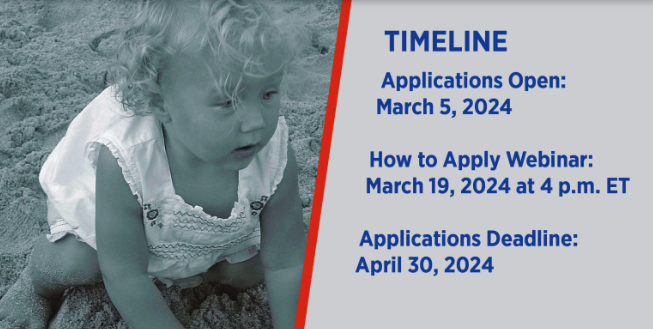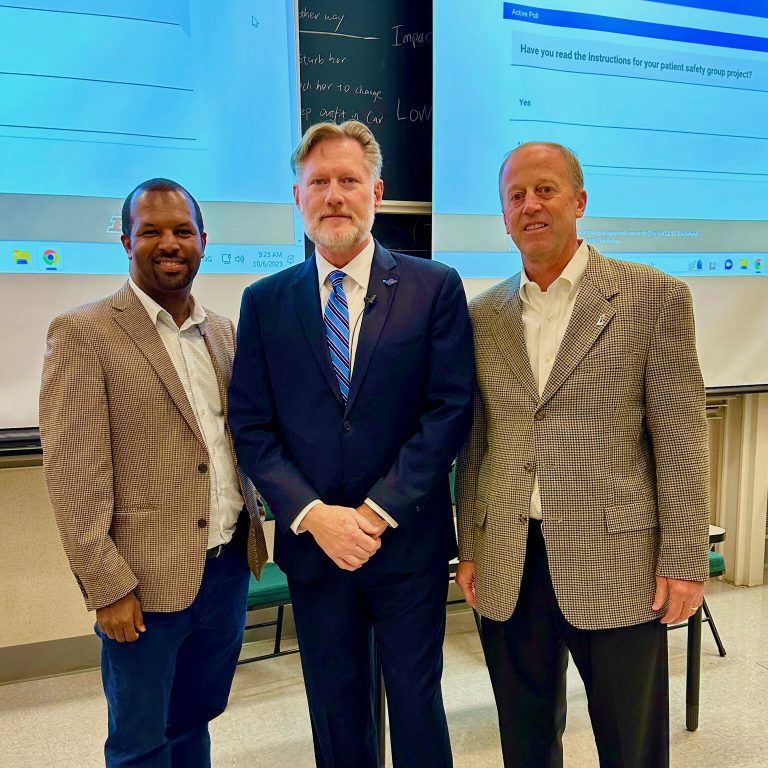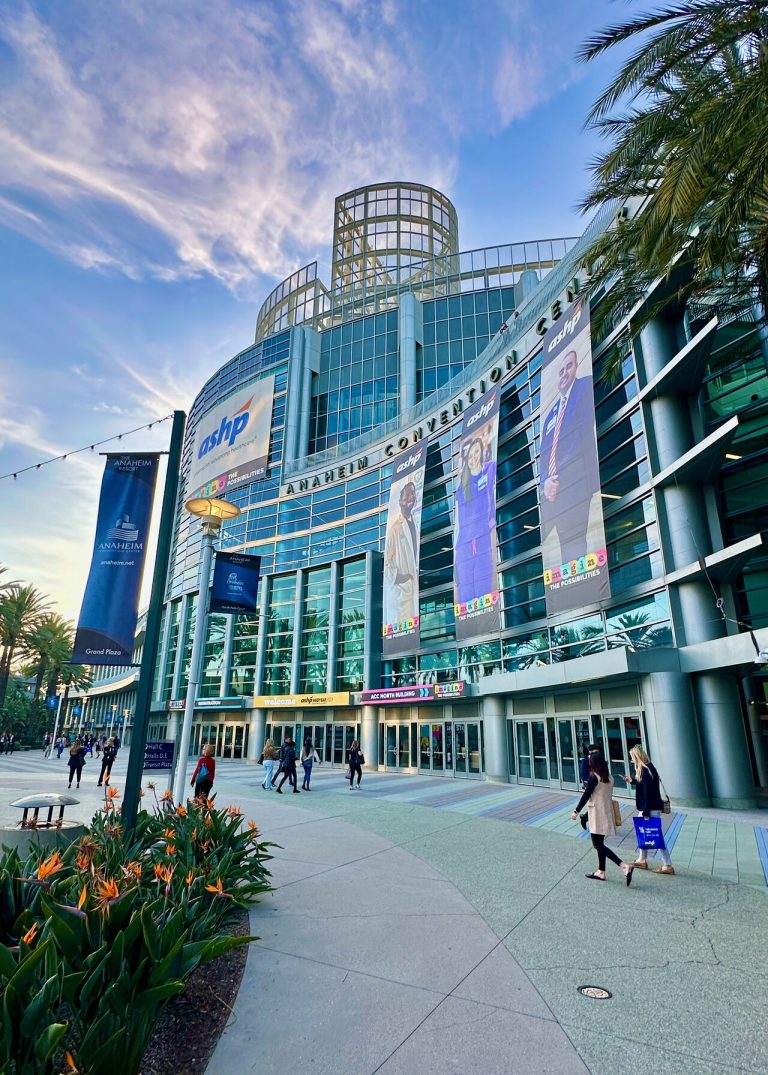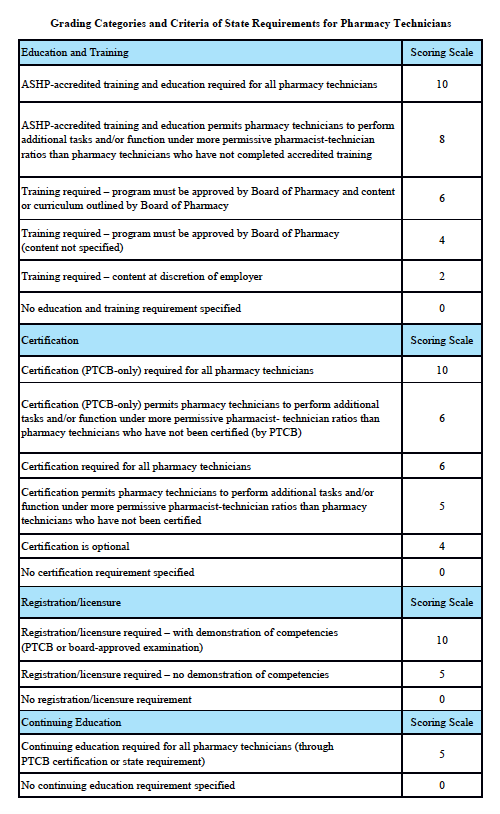
Second Academic Year for Medication Safety Scholars Program
March 22, 2024
Really excited to share the news that we will be beginning the second academic year for the Emily Jerry Foundation‘s Medication Safety Scholars Program! This comprehensive distance education and virtual engagement program was developed and successfully implemented over the… Read More



Utah Scorecard
Grading Scale:
A – 85-100%, B – 70-84.9%, C – 55-69.9%, D – 40-54.9%, F – 0-39.9%
Grading Categories & Criteria

Utah Law
I. Laws
UTAH STATUTES
http://www.dopl.utah.gov/laws/58-17b.pdf
58-1-307. Exemptions from licensure.
(4) Upon the declaration of a national, state, or local emergency, a public
health emergency as defined in Section 26-23b-102, or a declaration by the
President of the United States or other federal official requesting public
health-related activities, the division in collaboration with the board may:
(b) modify, under the circumstances described in this Subsection (4) and
Subsection (5), the scope of practice restrictions under this title for
individuals who are licensed under this title as:
(iv) a pharmacist, pharmacy technician, or pharmacy intern under
Chapter 17b, Pharmacy Practice Act;
58-17b-102. Definitions.
(33) “Licensed pharmacy technician” means an individual licensed with
the division, that may, under the supervision of a pharmacist,
perform the activities involved in the technician practice of
pharmacy.
(54) “Pharmacy technician training program” means an approved
technician training program providing education for pharmacy
technicians.
(55) (a) “Practice as a licensed pharmacy technician” means engaging
in practice as a pharmacy technician under the general
supervision of a licensed pharmacist and in accordance with
a scope of practice defined by division rule made in
collaboration with the board.
(b) “Practice as a licensed pharmacy technician” does not
include:
(i) performing a drug utilization review, prescription
drug order clarification from a prescriber, final
review of the prescription and prescribed drug
prepared for dispensing, dispensing of the drug, or
counseling a patient with respect to a prescription
drug;
(ii) counseling regarding nonprescription drugs and
dietary supplements unless delegated by the
supervising pharmacist; or
(iii) receiving new prescription drug orders when
communicating telephonically or electronically unless
the original information is recorded so the
pharmacist may review the prescription drug order as
transmitted.
(67) “Supportive personnel” means unlicensed individuals who:
(a) may assist a pharmacist, pharmacist preceptor, pharmacy
intern, or licensed pharmacy technician in nonjudgmental
duties not included in the definition of the practice of
pharmacy, practice of a pharmacy intern, or practice of a
licensed pharmacy technician, and as those duties may be
further defined by division rule adopted in collaboration
with the board; and
(b) are supervised by a pharmacist in accordance with rules
adopted by the division in collaboration with the board.
58-17b-301. License required – License classifications for individuals.
(1) A license is required to engage in the practice of pharmacy,
telepharmacy, or the practice of a pharmacy technician, except as
specifically provided in Section 58-1-307 or 58-17b-309.
(2) The division shall issue to an individual who qualifies under
this chapter a license in the classification of:
(a) pharmacist;
(b) pharmacy intern; or
(c) pharmacy technician.
58-17b-305. Qualifications for licensure of pharmacy technician.
(1) An applicant for licensure as a pharmacy technician shall:
(a) submit an application in a form prescribed by the division;
(b) pay a fee determined by the department under Section 63J-1-
504;
(c) produce satisfactory evidence of good moral character as it
relates to the applicant’s ability to practice pharmacy;
(d) complete a criminal background check and be free from
criminal convictions as described in Section 58-1-501;
(e) have no physical or mental condition of a nature which
prevents the applicant from engaging in practice as a
14
pharmacy technician with reasonable skill, competency, and
safety to the public;
(f) have completed a board approved program and curriculum of
education and training, meeting standards established by
division rule made in collaboration with the board; and
(g) successfully complete the examinations requirement within
the time periods established by division rule made in
collaboration with the board.
(2) A pharmacist whose license has been denied, revoked, suspended,
or restricted for disciplinary purposes is not eligible to be a
licensed pharmacy technician while on probation with the
division.
58-17b-309. Exemptions from licensure.
(2) In addition to the exemptions from licensure in Sections 58-1-307
and 58-17b-309.5, the following individuals may engage in the
acts or practices described in this section without being
licensed under this chapter:
(c) an individual engaging in the practice of pharmacy
technician under the direct personal supervision of a
pharmacist while making satisfactory progress in an
17
approved program as defined in division rule;
(3) In accordance with Subsection 58-1-303(1)(a), an individual
exempt under Subsection (2)(c) must take all examinations as
required by division rule following completion of an approved
curriculum of education, within the required time frame. This
exemption expires immediately upon notification of a failing
score of an examination, and the individual may not continue
working as a pharmacy technician even under direct supervision.
UTAH RULES
http://www.dopl.utah.gov/laws/R156-17b.pdf
R156-17b-102. Definitions.
(15) “ExCPT”, as used in this rule, means the Exam for the Certification of
Pharmacy Technicians.
(31) “PTCB” means the Pharmacy Technician Certification Board.
R156-17b-302. Licensure – Examinations.
(3) In accordance with Subsection 58-17b-305(1)(g), the examinations which must be
passed by an applicant applying for licensure as a pharmacy technician are:
(a) the Utah Pharmacy Technician Law and Rule Examination with a passing score of
at least 75 and taken at the time of making application for licensure; and
(b) the PTCB or ExCPT with a passing score as established by the certifying body.
The certificate must exhibit a valid date and that the certification is active.
R156-17b-304. Licensure – Education Requirements.
(1) In accordance with Subsections 58-17b-303(2) and 58-17b-304(7)(c), the
credentialing agency recognized to provide certification and evaluate equivalency of a
foreign educated pharmacy graduate is the Foreign Pharmacy Graduate Examination Committee
(FPGEC) of the National Association of Boards of Pharmacy Foundation.
(2) In accordance with Subsection 58-17b-304(6), an applicant for a pharmacy
intern license shall demonstrate that he meets one of the following education criteria:
6
(a) current admission in a College of Pharmacy accredited by the ACPE by written
verification from the Dean of the College;
(b) a graduate degree from a school or college of pharmacy which is accredited by
the ACPE; or
(c) a graduate degree from a foreign pharmacy school as established by a
certificate of equivalency from an approved credentialing agency defined in Subsection
(1).
(3) In accordance with Subsection 58-17b-305(1)(f), a pharmacy technician must
complete an approved program of education and training that meets the following
standards:
(a) The didactic training program must be approved by the Division in
collaboration with the Board and must address, at a minimum, the following topics:
(i) legal aspects of pharmacy practice including federal and state laws and rules
governing practice;
(ii) hygiene and aseptic techniques;
(iii) terminology, abbreviations and symbols;
(iv) pharmaceutical calculations;
(v) identification of drugs by trade and generic names, and therapeutic
classifications;
(vi) filling of orders and prescriptions including packaging and labeling;
(vii) ordering, restocking, and maintaining drug inventory;
(viii) computer applications in the pharmacy; and
(ix) non-prescription products including cough and cold, nutritional, analgesics,
allergy, diabetic testing supplies, first aid, ophthalmic, family planning, foot,
feminine hygiene, gastrointestinal preparations, and pharmacy care over-the-counter
drugs, except those over-the-counter drugs that are prescribed by a practitioner.
(b) This training program’s curriculum and a copy of the final examination shall
be submitted to the Division for approval by the Board prior to starting any training
session with a pharmacy technician in training. The final examination must include
questions covering each of the topics listed in Subsection (3)(a) above.
(c) Approval must be granted by the Division in collaboration with the Board
before a student may start a program of study. An individual who completes a nonapproved
program is not eligible for licensure.
(d) The training program must require at least 180 hours of practical training
supervised by a licensed pharmacist in good standing with the Division and must include
written protocols and guidelines for the teaching pharmacist outlining the utilization
and supervision of pharmacy technicians in training that includes:
(i) the specific manner in which supervision will be completed; and
(ii) an evaluative procedure to verify the accuracy and completeness of all acts,
tasks and functions performed by the pharmacy technician in training.
(e) An individual must complete an approved training program and successfully pass
the required examinations as listed in Subsection R156-17b-302(3) within one year from
the date of the first day of the training program, unless otherwise approved by the
Division in collaboration with the Board.
(i) An individual who has completed an approved program, but did not seek
licensure within the one year time frame must complete a minimum of 180 hours of
refresher practice in a pharmacy approved by the Board if it has been more than six
months since having exposure to pharmacy practice.
(ii) An individual who has been licensed as a pharmacy technician but allowed that
license to expire for more than two years and wishes to renew that license must complete
a minimum of 180 hours of refresher hours in an approved pharmacy under the direct
supervision of a pharmacist.
(iii) An individual who has completed an approved program, but is awaiting the
results of the required examinations may practice as a technician-in-training under the
direct supervision of the pharmacist for a period not to exceed three months. If the
individual fails the examinations, that individual can no longer work as at technicianin-
training while waiting to retake the examinations. The individual shall work in the
pharmacy only as supportive personnel.
(4) An applicant for licensure as a pharmacy technician is deemed to have met the
qualification for licensure in Subsection 58-17b-305(f) if the applicant:
7
(a) is currently licensed and in good standing in another state and has not had
any adverse action taken on that license;
(b) has engaged in the practice as a pharmacy technician for a minimum of 1,000
hours in that state within the past two years or equivalent experience as approved by the
Division in collaboration with the Board; and
(c) has passed and maintained current PTCB or ExCPT certification and passed the
Utah law exam.
R156-17b-302. Licensure – Examinations.
(1) In accordance with Subsection 58-17b-303(1)(h), the examinations that must be
successfully passed by an applicant for licensure as a pharmacist are:
(a) the NAPLEX with a passing score as established by NABP; and
(b) the Multistate Pharmacy Jurisprudence Examination(MPJE) with a minimum passing
score as established by NABP.
(2) In accordance with Subsection 58-17b-303(3)(j), an applicant applying by
endorsement is required to pass the MPJE.
(3) In accordance with Subsection 58-17b-305(1)(g), the examinations which must be
passed by an applicant applying for licensure as a pharmacy technician are:
(a) the Utah Pharmacy Technician Law and Rule Examination with a passing score of
at least 75 and taken at the time of making application for licensure; and
(b) the PTCB or ExCPT with a passing score as established by the certifying body.
The certificate must exhibit a valid date and that the certification is active.
(4) A graduate of a foreign pharmacy school shall obtain a passing score on the
Foreign Pharmacy Graduate Examination Committee (FPGEC) examination.
R156-17b-309. Continuing Education.
(1) In accordance with Section 58-17b-310 and Subsections 58-1-203(1)(g) and 58-1-
308(3)(b), there is created a requirement for continuing education as a condition for
renewal or reinstatement of a pharmacist or pharmacy technician license issued under
Title 58, Chapter 17b.
(2) Requirements shall consist of the following number of qualified continuing
education hours in each preceding renewal period:
(a) 30 hours for a pharmacist; and
(b) 20 hours for a pharmacy technician.
(3) The required number of hours of qualified continuing professional education
for an individual who first becomes licensed during the two year renewal cycle shall be
decreased in a pro-rata amount equal to any part of that two year period preceding the
date on which that individual first became licensed.
(4) Qualified continuing professional education hours shall consist of the
following:
(a) for pharmacists:
(i) institutes, seminars, lectures, conferences, workshops, various forms of
mediated instruction, and programmed learning courses, presented by an institution,
individual, organization, association, corporation or agency that has been approved by
ACPE;
(ii) programs approved by health-related continuing education approval
organizations provided the continuing education is nationally recognized by a healthcare
accrediting agency and the education is related to the practice of pharmacy;
(iii) programs of certification by qualified individuals, such as certified
diabetes educator credentials, board certification in advanced therapeutic disease
management or other certification as approved by the Division in consultation with the
Board; and
(iv) training or educational presentations offered by the Division.
(b) for pharmacy technicians:
(i) institutes, seminars, lectures, conferences, workshops, various forms of
mediated instruction, and programmed learning courses, presented by an institution,
individual, organization, association, corporation or agency that has been approved by
ACPE;
(ii) programs approved by health-related continuing education approval
organizations provided the continuing education is nationally recognized by a healthcare
accrediting agency and the education is related to the practice of pharmacy; and
(iii) educational meetings that meet ACPE continuing education criteria sponsored
by the Utah Pharmacist Association, the Utah Society of Health-System Pharmacists or
other professional organization or association; and
(iv) training or educational presentations offered by the Division.
(5) Credit for qualified continuing professional education shall be recognized in
accordance with the following:
(a) Pharmacists:
(i) a minimum of 12 hours shall be obtained through attendance at live or
9
technology enabled participation lectures, seminars or workshops;
(ii) a minimum of 15 hours shall be in drug therapy or patient management; and
(iii) a minimum of one hour shall be in pharmacy law or ethics.
(b) Pharmacy Technicians:
(i) a minimum of eight hours shall be obtained through attendance at live or
technology enabled participation at lectures, seminars or workshops; and
(ii) a minimum of one hour shall be in pharmacy law or ethics.
(iii) documentation of current PTCB or ExCPT certification will count as meeting
the requirement for continuing education.
(6) A licensee shall be responsible for maintaining competent records of completed
qualified continuing professional education for a period of four years after the close of
the two year period to which the records pertain. It is the responsibility of the
licensee to maintain such information with respect to qualified continuing professional
education to demonstrate it meets the requirements under this section.
The data contained in this 2012 Annual Scorecard are accurate as of December 2012 . Because statutes and regulations are continually revised, the data are subject to change. These data have been verified with the state board of pharmacy. This scorecard is updated on an annual basis in order to incorporate statutory and regulatory changes. A new scorecard will be issued in July 2013.
Scoring rationale for Education and Training:
In order to protect the public and help ensure patient safety, it is important that pharmacy technicians are properly educated and trained. The most rigorous training is accredited training. The sole entity empowered to accredit pharmacy-technician training programs is the American Society of Health-System Pharmacists (ASHP). Please note that this is “programmatic accreditation” – not “institutional accreditation.” It is the content of the training program – as measured against established standards – that is being evaluated and accredited. Accredited training is vital to protecting patient safety because it means that a pharmacy-technician training program has met established quality standards to provide assurance and confidence to the public. For more information, please see http://www.ashp.org/menu/Accreditation/TechnicianAccreditation.aspx.
Scoring rationale for Certification:
Certification is the process by which a nongovernmental agency or association grants recognition to an individual who has met certain predetermined qualifications specified by that agency or association. This is often determined by an examination process. Numerous organizations have recommended that the certification exam conducted by the Pharmacy Technician Certification Board (PTCB) should be recognized as the sole, nationally-accredited certification exam for pharmacy technician certification – including the National Association of Boards of Pharmacy (NABP), the Texas State Board of Pharmacy (TSBP), and the U.S. Department of Veterans Affairs (VA). In a recent report, NABP recommended that states be encouraged to “recognize certification by the Pharmacy Technician Certification Board (PTCB).” Moreover, NABP performed a psychometric audit of the PTCB’s pharmacy technician certification examination (PTCE) in 2001 and determined that the PTCE is psychometrically sound, defensible, and valid. In May 2010, the TSBP awarded the PTCB with the Pharmacy Technician Certification Provider contract in Texas. PTCB was selected for the contract after a rigorous bidding and evaluation process that included formal reviews and evaluations from three independent psychometricians. TSBP confidently recognizes PTCB as the single provider of certification examinations for pharmacy technicians. In addition, in June 2010, the VA began requiring PTCB certification for VA pharmacy technicians employed at grade GS-6 and above.
Scoring rationale for Registration/Licensure:
Registration/licensure is the process by which the state maintains a list of all pharmacy technicians in the state and grants permission for an individual to work as a pharmacy technician in the state based on the applicant’s completion of all pre-requisites to registration/licensure – such as required training and certification.
Scoring rationale for Continuing Education:
Continuing education enables pharmacy technicians to fulfill their professional responsibility to maintain competence and up-to-date knowledge and skills in an environment of technological advances and increasingly complex, new medications and therapies.
Our Mission
The Emily Jerry Foundation is determined to help make our nation’s, world renowned, medical facilities safer for everyone, beginning with our babies and children. We are accomplishing this very important objective by focusing on increasing public awareness of key patient safety related issues and identifying technology and best practices that are proven to minimize the “human error” component of medicine. Through our ongoing efforts The Emily Jerry Foundation is working hard to save lives every day.
Recent Posts
Archives